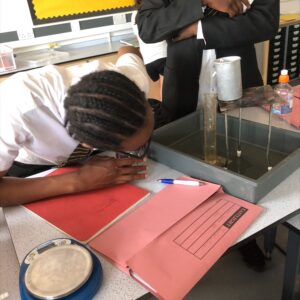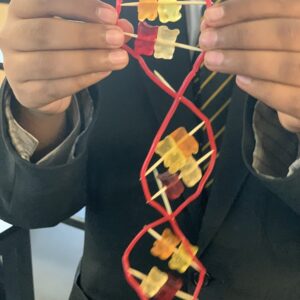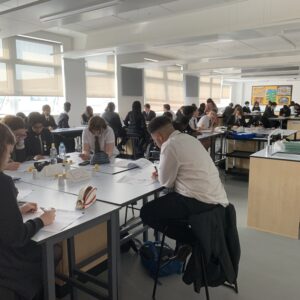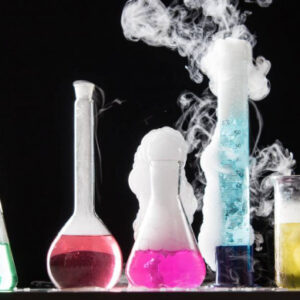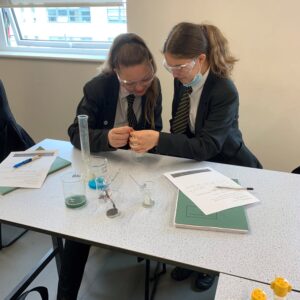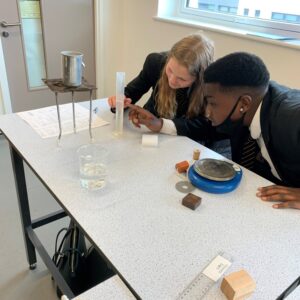Welcome to the Science Department. We aim to deliver the science curriculum so it is exciting, engaging and inspiring … a subject to be understood more and feared less. We also aim to fire pupils’ curiosity about the phenomena in the world and provide opportunities to find explanation whilst engaging our learners in the theoretical as well as direct practical learning experience.
Pupils discover how scientific ideas and evidence contributes to technological changes that drive industry, business and medicine whilst improving quality of life. Pupils learn how scientific knowledge and ideas are deeply rooted in evidence. They are encouraged to question and discuss scientific issues related to their lives and the physical and chemical aspects of science that affects the future of the world.
We adopt a spiral science curriculum with the topics taught in threads of key ideas and concepts. Science lessons provide the platform to further develop and practice problem solving and thinking skills as well as functional skills such as literacy, numeracy and ICT. We work closely with the Maths department to ensure we deliver numeracy skills in science effectively .
Our commitment to character education is evident in our lessons and expectation from pupils. In the science department, we integrate characteristics such as curiosity, resilience, critical thinking, openness, understanding, moral and ethical responsibilities, adaptability, respect, determination and a lot more valuable life virtues and skills to shape our students to become responsible citizens.
Key Stage 3
We undertake a 3 year KS3 science programme of study. Our science curriculum supports students as they:
- develop scientific knowledge and conceptual understanding through the specific disciplines of biology, chemistry and physics
- develop understanding of the nature, processes and methods of science through different types of science enquiries that help them to answer scientific questions about the world around them
- are equipped with the scientific knowledge required to understand the uses and implications of science, today and for the future.
In year 7 pupils have a baseline assessment to indicate gaps in their knowledge and understanding. All pupils in Year 7-9 follow a common curriculum with about 7 hour’s lessons every fortnight. We build on the KS2 science curriculum by using the introduction to science topic which equips all students with the essential safety and practical skills.
The principal focus of science teaching in key stage 3 is to develop a deeper understanding of a range of scientific ideas in biology, chemistry and physics. Pupils should begin to see the connections between these subject areas and become aware of some of the big ideas underpinning scientific knowledge and understanding. Examples of these big ideas are:
- the links between structure and function in living organisms
- the particulate model as the key to understanding the properties and interactions of matter in all its forms
- the resources and means of transfer of energy as key determinants of all of these interactions.
They should be encouraged to relate scientific explanations to phenomena in the world around them and start to use modelling and abstract ideas to develop and evaluate explanations.
Using experiments and practical task, pupils are taught to:
- pay attention to objectivity and concern for accuracy, precision, repeatability and reproducibility
- understand that scientific methods and theories develop as earlier explanations are modified to take account of new evidence and ideas, together with the importance of publishing results and peer review
- evaluate risks
Key stage 4
Key stage 4 science continues with the process of building upon and deepening scientific knowledge, the understanding of ideas and virtues developed in earlier key stages in the subject disciplines of Biology, Chemistry and Physics. Students are taught separate sciences –Biology, Chemistry and Physics or Combined Science.
Studying the sciences in key stage 4 provides the foundation for KS5 Biology, Chemistry and Physics studies as well as establishing the basis for a wide range of careers. For others, it might be their last formal study of science subjects that provide the foundations for understanding the lives and their environment.
These key ideas from Biology, Chemistry and Physics include:
- the use of conceptual models and theories to make sense of the observed diversity of natural phenomena
- the assumption that every effect has one or more cause
- that change is driven by interactions between different objects and systems
- that many such interactions occur over a distance and over time
- that science progresses through a cycle of hypothesis, practical experimentation, observation, theory development and review
- that quantitative analysis is a central element both of many theories and of scientific methods of inquiry
Key Stage 5
AS and A level subject content sets out the knowledge, understanding and skills common to all AS and A level specifications in Biology, Chemistry, Physics and Psychology.
AS and A level specifications in a science subject encourage students to:
- develop essential knowledge and understanding of different areas of the subject and how they relate to each other
- develop and demonstrate a deep appreciation of the skills, knowledge and understanding of scientific methods
- develop competence and confidence in a variety of practical, mathematical and problem solving skills
- develop their interest in and enthusiasm for the subject, including developing an interest in further study and careers associated with the subject
- understand how society makes decisions about scientific issues and how the sciences contribute to the success of the economy and society
Curriculum Enrichment
- KS3 Science Homework Club – Afterschool open workshop to help and support pupils.
- KS3/KS4 STEM Club – hosted by More Able Lead Teacher in Science.
- Biology Olympiad – Eastbrook continues to take part in this Olympiad after winning Gold, Silver and Bronze awards on March 2020.
- Chemistry Mastermind – Eastbrook participates in this quest after qualifying as semi-finalist in 2019.
- Science Silent Reading – Science Open Area encourages silent reading for all pupils.
- Science Intervention – Well planned and resourced activities for GCSE and A level students.
Homework
Homework is set to build on the skill and knowledge acquired in the classroom. Research assignments help students to conduct independent research on selected topics.
For KS4 and KS5, the homework also includes past exam papers which helps students to revisit and consolidate what they have previously learnt.
Career opportunities – Just a few careers outlined below:
Analytical chemist, Animal technician, Biomedical scientist, Clinical scientist, Community pharmacist, Crime scene investigator, Food technologist, Forensic scientist, Lab Technicians, Chemical engineers, Science teacher, Lecturer, Veterinary, Nurse practitioner, Mid-wife, Quality control analyst, Data analyst, Mechanical and civil engineers, Electricians, Food analyst, Opticians, Physiotherapist, Medical Doctor, Microbiologist; Hazardous Waste Manager, Science media, Science reporter, Aerospace engineering, Astrophysicist, Computer programmers, Astronauts, Botanist, Agricultural scientist, Meteorologists, Chemist, Science writer, Water quality scientist, Geneticist……
Exam Boards
We currently follow these specifications:
GCSE Science
- GCSE OCR GATEWAY Biology (9-1) – J247
- GCSE OCR GATEWAY Chemistry (9-1) – J248
- GCSE OCR GATEWAY Physics (9-1) – J249
- GCSE OCR GATEWAY Science A, Combined –J250
Year 12/13 courses
- A Level OCR BIOLOGY A OCR – (H420)
- A Level Edexcel CHEMISTRY – (9CHO)-Pearson
- BTEC Science -Pearson
Support for exams
The following links are excellent learning resources
- GCSE Pod: https://www.gcsepod.com/
- KS4 Text Book : www.kerboodle.co.uk
- https://www.bbc.com/bitesize/examspecs/z92x7hv
- https://www.bbc.com/bitesize/subjects/zrkw2hv
- https://www.samlearning.com/
- https://www.gcsepod.com/
- https://www.youtube.com/ (free science lessons)
- https://ocr.org.uk/qualifications/past-papers/
- https://qualifications.pearson.com/en/qualifications/edexcel-a-levels/chemistry-2015.html
- https://qualifications.pearson.com/en/support/support-topics/exams/past-papers.html
- https://www.chemguide.co.uk
- http://www.rsc.org/
- www.Scool.co.uk
- www.Physicsand maths tutor.co.uk
- www.Dynamiclearning.co.uk

